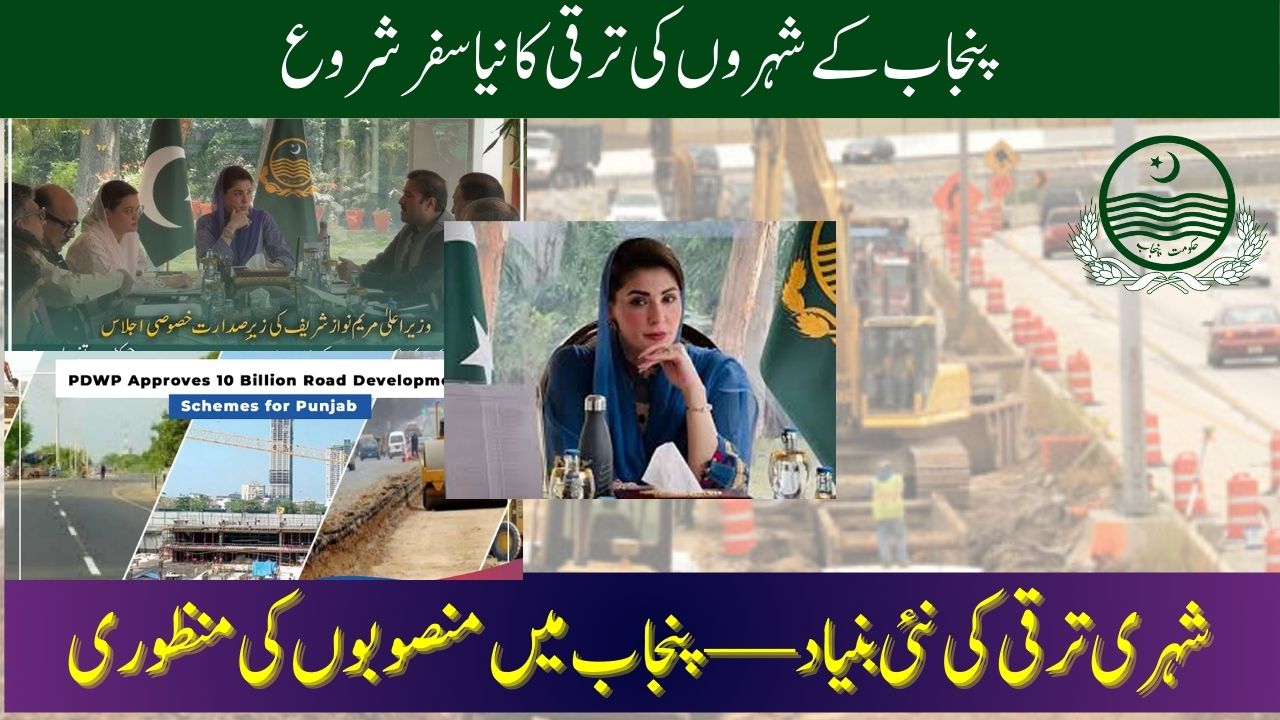In a significant move aimed at enhancing Punjab Development Projects 2025, Chief Minister Maryam Nawaz has given approval for comprehensive construction, repair, and rehabilitation projects in major cities throughout the province. The decision, announced during a high-level meeting held in Lahore on Tuesday, outlines an ambitious phase-wise approach to address critical infrastructure needs while incorporating sustainable solutions and community amenities.
Strategic Phase-Wise Implementation Plan
The Punjab government has adopted a systematic approach to urban development, prioritizing essential infrastructure improvements in phases. This methodical strategy ensures efficient resource allocation and allows authorities to address the most pressing needs first while maintaining a long-term vision for comprehensive urban renewal.
First Phase: Focus on Water Management Infrastructure
The initial phase of this extensive urban renewal initiative will concentrate on developing robust sewage and drainage systems across fifty-nine cities in Punjab. This prioritization reflects the government’s recognition of effective water management as a foundational element of urban infrastructure and public health.
| Phase | Primary Focus | Number of Cities | Key Components |
|---|---|---|---|
| Phase One | Sewage & Drainage | 59 cities | – Comprehensive sewage system development<br>- Enhanced drainage infrastructure<br>- Flood prevention measures<br>- Wastewater management solutions |
| Future Phases | Additional Infrastructure | TBA | – Road networks<br>- Public facilities<br>- Additional urban amenities<br>- Extended coverage to more cities |
Punjab Development Projects 2025 Sustainable Energy Solutions
Solar-Powered Water Supply Systems
In a forward-thinking move that addresses both environmental concerns and economic challenges, the meeting concluded with a decision to transition water supply tube wells to solar energy. This innovative approach serves multiple objectives:
- Cost Reduction: Significantly lowering electricity expenses for municipal operations
- Energy Security: Ensuring consistent water supply even during power outages
- Environmental Benefits: Reducing carbon emissions from traditional power sources
- Long-term Savings: Decreasing operational costs after initial investment
- Resource Independence: Reducing reliance on national electricity grid
This solar initiative represents a practical application of sustainable development principles, combining essential service provision with renewable energy adoption.
Community Recreation Enhancements
Prioritizing Public Spaces for All Ages
Chief Minister Maryam Nawaz has specifically directed that all new park projects must include:
- Playground Equipment: Age-appropriate swings and play structures
- Sports Facilities: Infrastructure for various physical activities
- Recreational Areas: Spaces designed for community gathering and leisure
This directive reflects a holistic approach to urban development that recognizes the importance of accessible recreational spaces for public health, community cohesion, and quality of life.

Impact on Urban Living Quality
The approved projects are expected to have far-reaching effects on urban communities throughout Punjab:
Infrastructure Reliability
Improved sewage and drainage systems will address persistent issues such as:
- Waterlogging during monsoon seasons
- Sanitation challenges in densely populated areas
- Environmental contamination from inadequate waste management
- Public health risks associated with standing water
Economic Benefits
The initiative carries significant economic advantages:
- Job Creation: Numerous construction and maintenance positions
- Property Value Enhancement: Areas with improved infrastructure typically see increased property values
- Business Environment Improvement: Reliable infrastructure attracts commercial investment
- Reduced Health Costs: Better sanitation leads to fewer waterborne illnesses
- Tourism Potential: Cities with well-maintained infrastructure attract more visitors
Important Read: CM Punjab Free E-Bike Scheme for Students 20,000+ Apply Now
Environmental Sustainability
The integration of solar energy and improved water management contributes to environmental goals:
- Reduced carbon footprint from municipal operations
- Decreased water pollution from inadequate sewage systems
- More sustainable resource utilization
- Adaptation to climate change challenges
- Potential groundwater conservation through better management
Comprehensive Urban Vision
The meeting decisions reveal a multidimensional approach to urban development that balances:
- Essential Infrastructure: Addressing fundamental needs like water and sanitation
- Sustainability Principles: Incorporating renewable energy solutions
- Quality of Life Factors: Including recreational facilities for community wellbeing
- Economic Considerations: Finding cost-effective approaches to service delivery
This balanced perspective suggests a sophisticated understanding of urban development challenges and opportunities.
Leadership Approach
Chief Minister Maryam Nawaz’s direct involvement in these infrastructure decisions demonstrates hands-on leadership in shaping Punjab’s urban future. By personally chairing the meeting and issuing specific directives regarding park facilities, the Chief Minister signals that urban development remains a top priority for her administration.
The emphasis on both essential infrastructure and quality-of-life amenities reflects a governance approach that aims to address both immediate necessities and longer-term community wellbeing.
Regional Punjab Development Projects 2025 Balance
While the announcement did not specify which 59 cities will benefit from the first phase, the phase-wise approach suggests an intention to eventually extend improvements throughout Punjab’s urban landscape. This systematic expansion has the potential to:
- Reduce development disparities between major and smaller cities
- Create more balanced economic opportunities across the province
- Address long-standing infrastructure deficiencies in previously neglected areas
- Establish consistent urban service standards throughout Punjab
Future Outlook
As the first phase focusing on sewage and drainage systems commences, residents of Punjab’s cities can anticipate further announcements regarding:
- Specific timeline for the completion of first-phase projects
- Details of cities included in the initial implementation
- Scope and focus of subsequent development phases
- Additional sustainable initiatives in urban management
- Further recreation and community facility enhancements
Conclusion: A New Chapter in Punjab’s Urban Development
The approval of phase-wise construction, repair, and rehabilitation Punjab Development Projects 2025 marks a significant milestone in Punjab’s urban development trajectory. By prioritizing essential infrastructure like sewage and drainage systems, incorporating sustainable energy solutions, and mandating recreational facilities in public spaces, the Punjab government under CM Maryam Nawaz’s leadership is addressing both immediate needs and long-term sustainability goals.
This comprehensive approach to urban renewal promises to enhance the quality of life for millions of Punjab residents while setting new standards for sustainable urban development in Pakistan. As the first phase targeting 59 cities begins implementation, communities across Punjab Development Projects 2025 can look forward to improved infrastructure, more reliable municipal services, and enhanced public spaces that foster healthier, more vibrant urban environments.
Frequently Asked Questions (FAQs)
When will construction work begin on these projects?
While specific start dates haven’t been announced, the approval suggests implementation planning is underway. Construction typically begins within 3-6 months of such high-level approvals, following detailed engineering assessments and contractor selection processes.
Which 59 cities will benefit from the first phase of sewage and drainage improvements?
The specific list of cities hasn’t been publicly released yet. However, it’s likely to include major population centers and areas with particularly urgent infrastructure needs. Future announcements from the Punjab government should provide this detail.
How will these projects be funded?
The funding model wasn’t specified in the announcement, but similar projects typically utilize a combination of provincial budget allocations, development funds, and possibly public-private partnerships. The solar conversion aspect may attract special green financing options.
Will these improvements affect water and municipal service charges?
While not addressed in the initial announcement, infrastructure improvements sometimes correlate with updated service charges. However, solar conversion of tube wells may actually reduce operational costs, potentially offsetting any increase in maintenance expenses.
How long will it take to complete the first phase of the project?
The timeline wasn’t specified, but urban infrastructure projects of this scale typically require 1-3 years for full implementation across multiple cities, with individual city projects completed in stages.
Will there be any disruption to daily life during construction?
Some temporary disruption is inevitable during infrastructure construction. However, phase-wise implementation is often designed to minimize inconvenience, with work typically scheduled to impact smaller areas at any given time.
How can citizens provide input about park facilities in their neighborhoods?
While not outlined in the announcement, Punjab municipal authorities typically have public feedback mechanisms through local government offices or online portals. Citizens are encouraged to engage with their local representatives regarding specific community needs.
Also Read: CM Punjab Maryam Nawaz Field Hospital Program: Healthcare Revolution for Rural Punjab
